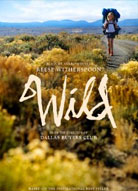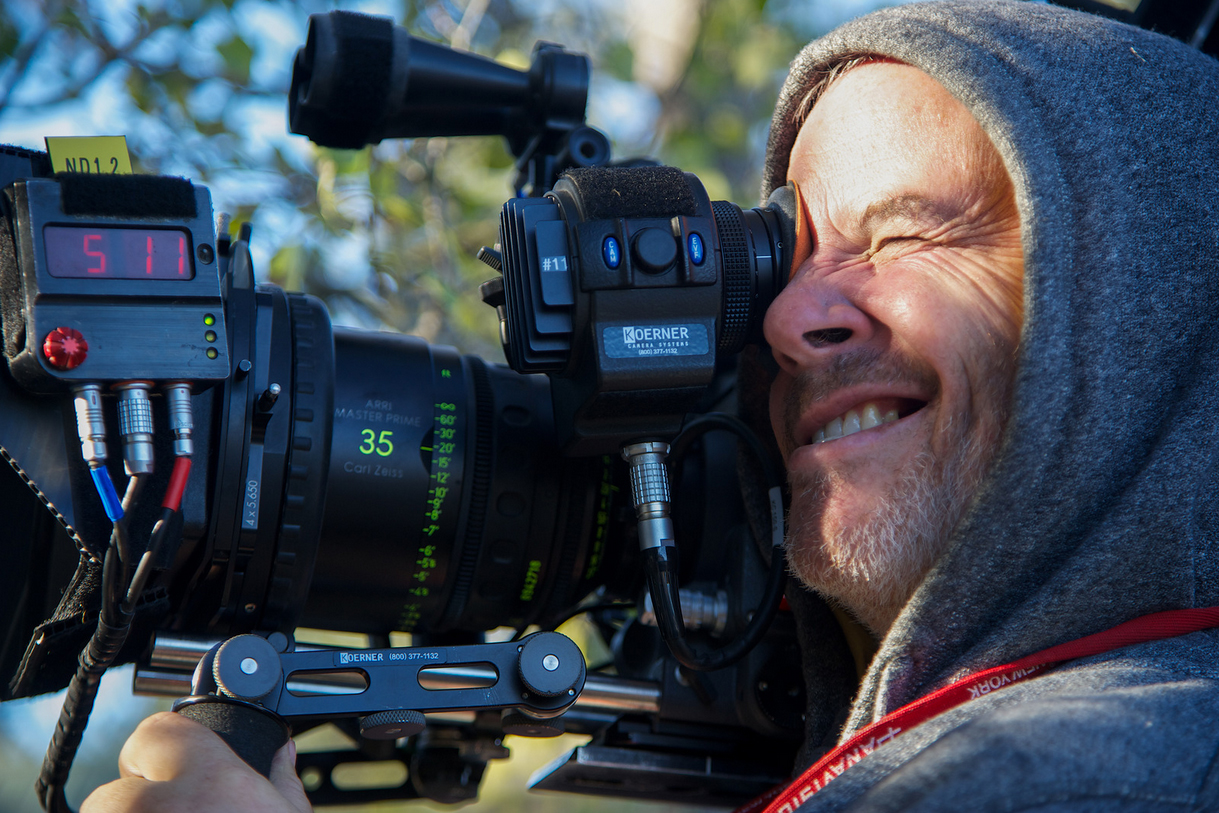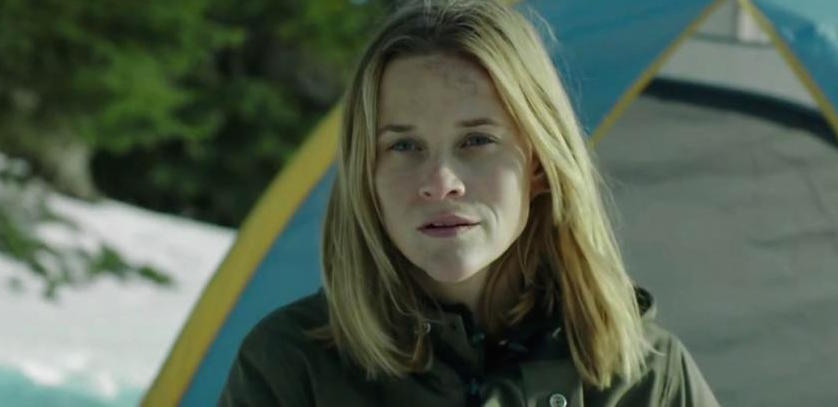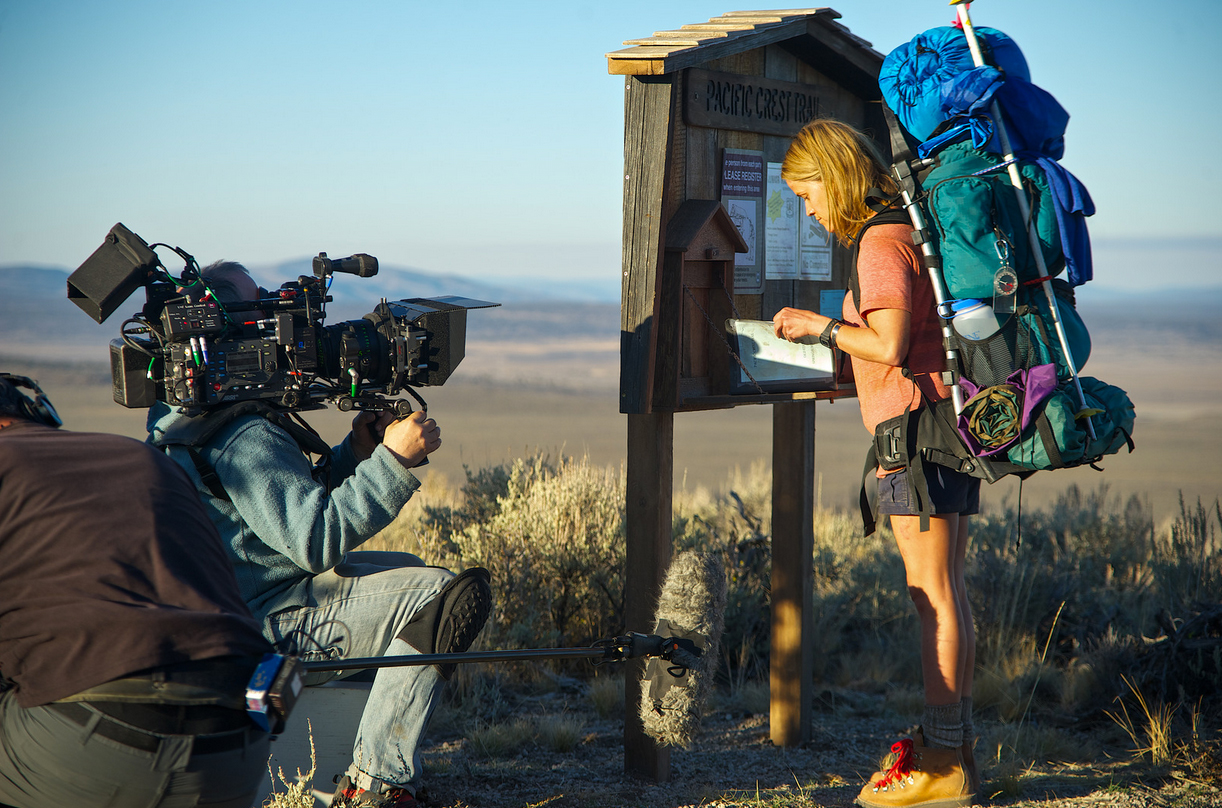Interview: Yves Belanger on Shooting Reese's Face as Landscape in "Wild"
 Monday, December 29, 2014 at 10:30PM
Monday, December 29, 2014 at 10:30PM  I didn't come up with this analogy but it's a good one: Yves Belanger is like Ginger Rogers to Reese Witherspoon's Fred Astaire in Wild. He does it backwards. While in heels. While carrying tons of camera equipment!
I didn't come up with this analogy but it's a good one: Yves Belanger is like Ginger Rogers to Reese Witherspoon's Fred Astaire in Wild. He does it backwards. While in heels. While carrying tons of camera equipment!
One of the most beautiful film experiences you can have this year is taking a cathartic hike with Wild. The adaptation of Cheryl Strayed's popular memoir has been praised extensively for its heartfelt actressing but less attention has been paid to the indelible contributions of the men recording and dramatizing the journey. In addition to a fantastic sound mix and accomplished editing, the cinematography by Yves Belanger contributes greatly to this film's evocative journey.
Wild is Belanger's second film with Jean Marc-Vallée and I talked to him about his director, his rapport with Reese and capturing the human face as landscape.
NATHANIEL R: I understand you've known Jean-Marc Vallée for a long time so why did it take so long to work togther? It must be going well since you've at work on your third consecutive feature together.
YVES BELANGER: I met Jean-Marc in 1991. He was starting as a young director in commercials. They matched us together but when he did his first feature, I don't know why, he took someone else. With C.R.A.Z.Y. it was like bad timing - we spoke about it but the money comes very fast and when he was ready to do it I couldn’t. Since Dallas Buyer's Club we are back together.
Both of your films together have major movie stars. Do you feel you've gone 'full Hollywood' ?

No, I still feel we’re doing Jean-Marc movies. Our third film Demolition also has movie stars. But stars are first actors so they want to work hard. It's very easy to work with them. I work and act the same way with them as with actors in Quebec. We just drink better wine. [Laughter]
These really are very intimate movies. From photos I've seen from the set you're right in their face with the camera.
I was always a little bit like that. I always want to go close up with a 35 mm. Jean-Marc is the same. We're always going to be close to the people. It’s very simple plus we don’t use artificial movie lights. The only control we do is choosing time of day and location. Inside apartments we’ll change the lamps and window covers. Our principle is 'Start with reality, but control it.'
Do the actors like that intimate a rapport with the DP?
I've never had complaints. What you have to do is be their friends right away and try to wash yourself so you smell good because you’re always together. Jean-Marc chooses projects not only for the content but for the human qualities of the people. So we would never work with assholes. [Laughter]
Before Wild had you ever done this much work outdoors as a DP.
Yes. But I discovered the landscapes were so different. We realized very fast that because we were not lighting or reflecting a bounce card on our actress that her face would take on the colors of the landscape. So if we were in the desert everything would become gold. When we’re in the forest it would be different. By not lighting the people the face becomes the landscapes. It’s great. I try not to light exteriors but use them because it's a lot more alive.
I think all the lighting for outdoors in the past was to create continuity… they were shooting very slowly. But Jean-Marc shoots fast. The continuity is fine because the light doesn’t have a lot of time to change. We want to shoot the human faces and the landscape the same way. We want to start from the landscape and rack focus to the face, as big as the landscape you’ve just seen.

I'm sure that's better for the actors, too.
Sometimes we do the whole scenes without cutting. I'm handheld. I’ll do Reese and go over her and do the man she’s talking to and then back up for a two-shot and then a point of view. We do that in one shot and one place. The actors like it because there’s nothing to cut their concentration.
I love longer takes and they’re making a comeback, thank God. You can see the performances so much better.
People are not stupid. When there are a lot of cuts you know there’s a trick there or they're cutting around a mistake. If you shoot a dance or a fight without cutting, people think 'Ooh this is real. these people are good.'
The flashbacks have a different visual feel though.
We used older lenses. They can be a little mushy and I was underexposing. We made it more dirty.
Since you weren’t doing extensive lighting, what was the biggest challenge?
Exposing. Sometimes I have a lot of difference of quantity of light from one angle to another. With the Alexa camera if I underexpose when there’s strong light and overexpose everything that’s a little dark, at the end with the editing and color timing I can bring back everything. It's really incredible.
But what I do because of necessity I have my finger on the ring that controls exposure and I change it always during takes when I’m panning. It’s always invisible. This, and choosing the good framing is very important. Sometimes you want to be at this angle for the human face but the light is not good so you compromise but not too much. Jean-Marc’s best shot is something imperfect that’s perfect. It’s very tough to achieve. [Laughs]
It sounds on this particular shoot almost like you’re juggling, really: walking backward, shifting exposure, working instinctively. How on earth do you do it?
I’m quite old and frankly I don’t know how I do it. I was never an ahtlete when I was young but I’m strong. With Jean-Marc he’s very precise. I improvise sometimes but if he says he wants my frame to finish on the third three or the first red flower on the left I have to do it. Or if the actress is doing something very important in the foreground and he says 'don't hide the door in the background' I have to frame the actress and react with her emotions but make sure the door isn’t hidden by her or by something else.
...Plus, I have to not trip on the furniture. Or the rocks. [Laughs]
And all while walking backwards.
Walking backwards is quite easy! I have these very soft shoes it's like [makes "boing" sound]. Reese was amazed but she was carrying the same weight as me. We both had 40 lbs on our shoulders.

I know you're going to keep working with Vallée but you also worked recently with Xavier Dolan on Laurence Anyways. Will you work with him again?
I did Laurence Anyways just before Dallas and we wanted to work together again. When I got Dallas he decided to go make a movie with his friends for almost no money. We met and he said "go do Dallas. I know it's going to be good for your career." He is only 24 and he was very right. Xavi and Jean-Marc are always shooting at the same time.
Well, they're both prolific. Which is good for you. Okay final question: which scenes in Wild were the hardest to shoot?
Oh my god. It was tough at the beginning because I was not in shape. I was always afraid of passing out during the scenes. We had a good budget for what we were going. We had time. But the preparation was incredible. There was one scene when I'm in the shower with her. I’m a little shy so it was a little intimidating to be with this great woman. She’s naked in front of you. But we were already friends so I took off my glasses so it was a little out of focus.
There’s a little scene at the beginning when her toe was…
Oh god that scene!
This location was very dangerous, very high. My key grip was behind me but if something happened I would just die. It's weird. When you have a camera you don’t think about it. You think you’re immortal.

More on Wild
Laura Dern interview
Cinematography articles



Reader Comments (5)
"When you have a camera you don’t think about it. You think you’re immortal."
The perfect DP.
Great interview Nat...it just goes to show your insight into movies..
Lovely interview. Just saw the film this weekend and was bowled over. They found such moving and smart ways to depict memory and thought. And I loved how it didn't spoon feed things to the viewer. Why do you think it isn't getting the Oscar buzz that it deserves? (Is it sexism?)
Hearing from cinematographers always opens up the film in new ways. Thanks for this.
If you feel that you need a good resume and you cannot write it on your own, you should check the top 5 resume writing service review 2016 and select the most suitable resume writer from you. These reviews are based on the real customers' experience and have a lot information to share about their services.